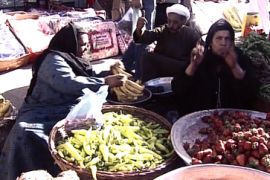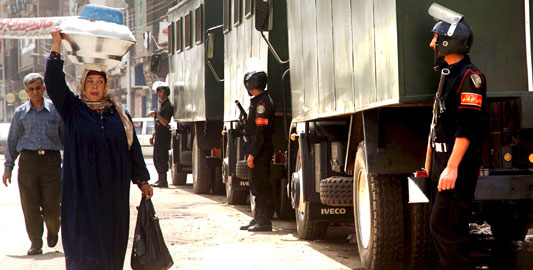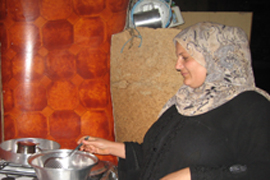Egyptian families battle inflation
They find it difficult to make ends meet despite public sector wage increases.

 |
| Egypt’s security forces have clamped down on protesters and demonstrations critical of the economic policies of Hosni Mubarak, the president [EPA] |
Two months after thousands of Egyptians took to the streets to protest food price hikes, families in the lower income bracket say they are still struggling to make ends meet despite an increase in public sector wages.
Mervat Saad, a 45-year-old housewife in Cairo, says she has now given up on buying large quantities of rice and macaroni for her family.
Keep reading
list of 4 itemsBehind India’s Manipur conflict: A tale of drugs, armed groups and politics
China’s economy beats expectations, growing 5.3 percent in first quarter
Inside the pressures facing Quebec’s billion-dollar maple syrup industry
“I used to feed the kids rice and macaroni to fill them up. Now that the prices of rice and macaroni have tripled, we have become more dependent on bread as it is relatively cheaper and gets them full,” she told Al Jazeera.
Since mid-2007, food and fuel prices have increased dramatically. In figures released by the Ministry of Finance, year-on-year inflation for the period ending March 2008 reached 14.4 per cent.
In the same month, Cairo announced plans to increase the wages of public sector and government employees by at least 15-30 per cent with a significant increase due in fiscal year 2009/2010. Teachers were to receive a 150 per cent increase in gradual increments.
“How can we live?”
 |
| Saad says she can no longer afford rice or macaroni and resorts to cheap bread |
Saad, whose husband works as a porter and doorman in a building in Cairo’s Heliopolis suburb, says she is trying to understand that inflation is a global problem.
But she has also come to realise that local salaries are not comparative on a global scale.
“Before, we used to get our monthly storage of the food and keep it, but now we are cutting off the unnecessary items to afford buying the basic food like the rice, sugar and oil day by day,” she said.
Saad is living with her husband and two children in a small room extension above the garage of the building her husband minds. As he is not employed in the public sector, he will not be impacted by the government wage raise.
A kitchenette equipped only with a stove top and metal sink overlooks a small corner of the garage. There is no refrigerator.
“Can you believe that a kilo-and-a-half of eggplants used to cost LE 1 ($0.18) and now the one kilo costs LE 4 ($0.74)? The same applies on all food items while our income has not increased. So, how can we live?” she said.
Up-down economics
| Related articles |
|
Egypt increases price of fuel Clashes break out in Egypt town Textile town mirrors nation’s mood |
To make matters more difficult, the Egyptian government raised fuel prices in late March in the hopes of raising LE 14 billion ($2.6 billion) to pay for the public sector wage increases.
Such tactics, says Shadia, a 49-year-old single mother of two and a government employee who lives in Cairo’s downtown Ghamra district, amount to ‘up-down economics’.
“We wish they [the government] didn’t grant us the 30 per cent raise and then bring it down again with the increase in gasoline prices. They should have kept the prices the same as before,” she told Al Jazeera.
“Cooking oil which is the staple in our diet has gone crazily high. I used to buy two bottles of oil for LE 15 ($2.7), whereas now the one alone costs LE 13 ($2.5),” she said.
Rising food and fuel prices have also impacted the private tutoring sessions which are used by many Egyptian high school students to supplement their studies ahead of end-of-year exams.
Shadia’s salary is LE 650 ($122) of which almost half is spent on private lessons for her son. According to the finance ministry, the annual inflation rate in the education sector for the period ending April 2008 was over 37 per cent.
“Only yesterday I paid LE 60 ($11.6) for two revision sessions; it is mid-month now and I only have LE 7 ($1.3) to last till the end of June,” she said.
But Youssef Boutros Ghali, the Egyptian finance minister, said the increase in fuel prices would not significantly add to the already high inflation rate.
“It has a very short-term effect, everybody panics, everybody gets upset, all prices go up. When they see that it is not what they feared it would be, it comes down again a month or two later,” he told a group of reporters at the ministry last month.
Barely surviving
Ghali’s words, however, offer no comfort for Aziza Hamed, an unemployed and uneducated mother of four living in Old Cairo. Her husband, Mahmoud Sayyed operates a makeshift kiosk in front of Ain Shams University where he sells tissues and chocolate. The family says they are barely able to live hand to mouth.
“Three weeks ago, I went to buy a bottle of oil and because I could not afford it, I only bought a quarter of the bottle after I asked the seller to put it for me in a plastic bag,” Hamed said.
Two of her children have dropped out of school in hopes of gaining employment to help the family survive. The fact they will no longer be able to receive an education weighs heavily on their mother.
“When I dropped out of school at 11, it was because I was the youngest and my family didn’t see the importance for me. It was not for financial reasons. But now when I look at my oldest children who have to try and find work to bring us money, I feel guilty. I feel I have failed to give them a future,” she said.
According to the finance ministry’s data, food and beverages inflation continue to rise, hitting 22 per cent for the year-period ending April 2008. Transportation costs for the same period have increased by 5.8 per cent.
Saad, whose husband works as a porter, can only shake her head as she says the economic crisis facing the country is the beginning of an “even worse” situation.